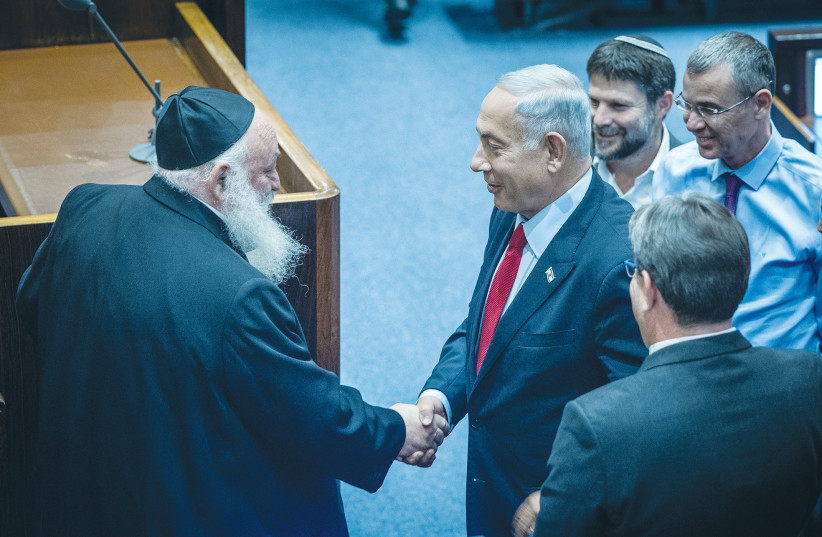Netanyahu promises his gov’t will last ahead of budget voting
The government will rule for four full years and continue to surprise its naysayers, Prime Minister Benjamin Netanyahu said in a statement to the press, before voting began on the 2023-2024 national budget on Tuesday evening.
The coalition surprised everyone when it formed a government, it surprised the Palestinian Islamic Jihad during the recent Operation Shield and Arrow, it continues to surprise Iran in clandestine operations, and it will continue to surprise and prove opponents wrong, Netanyahu added.
Minutes later, in a statement of his own, opposition leader MK Yair Lapid criticized the NIS 13.6 billion in coalition funding, which include over NIS three billion in funds for haredi private schools or yeshivot that do not include core secular studies – and showed that it was higher than the NIS 12.4 billion for public hospitals, or the NIS 12.6 billion for higher education.
“Netanyahu did surprise – a bad surprise,” Lapid said. “Our children will be the first generation that will be poorer than its parents, because more and more people will not work and will not receive tools for the workplace, will not study mathematics, English and computers, and will not be able to support themselves, so someone will need to support them,” Lapid said.
The Knesset debate began on the hundreds of sections of the 2023-2024 national budget at approximately 9:30 p.m. on Tuesday evening, at the suspension of a marathon of speeches mainly by opposition Knesset members, that lasted all day Monday and were to resume on Tuesday at 10:00 a.m.
 LIKUD LEADER BENJAMIN Netanyahu shakes hands with United Torah Judaism MK Yitzhak Goldknopf in the Knesset last week. If Netanyahu’s promise of a full budget for all haredi educational institutions is realized, the already-low incentive to provide core studies will disappear entirely. (credit: YONATAN SINDEL/FLASH90)
LIKUD LEADER BENJAMIN Netanyahu shakes hands with United Torah Judaism MK Yitzhak Goldknopf in the Knesset last week. If Netanyahu’s promise of a full budget for all haredi educational institutions is realized, the already-low incentive to provide core studies will disappear entirely. (credit: YONATAN SINDEL/FLASH90)Just before the voting begins, the marathon will conclude with speeches by Finance Minister Bezalel Smotrich, Prime Minister Benjamin Netanyahu, opposition leader MK Yair Lapid and Knesset Finance Committee chairman MK Moshe Gafni.
The plenum will begin voting on the second reading of the bills, which will likely include hundreds of votes, due both to the fact that every clause of the budget bills must be approved separately, and the opposition can file up to 150 reservations, which will also be put to a vote. This voting session is likely to last throughout the night and into Wednesday.
Ultimately, the plenum will hold a third and final reading of the bills, after which the plenum will vote to approve them in their entirety. By passing this vote, the bills will become law.
How did Israel’s coalition overcome the challenges against the budget?
The budget bills are expected to pass, after Netanyahu and Smotrich succeeded on Monday evening to overcome last-minute challenges by three coalition partners – Agudat Yisrael, Otzma Yedhuit and Noam.
Both Agudat Yisrael, the Hassidic faction within United Torah Judaism (UTJ) and Otzma Yehudit were promised NIS 250 million in coalition funding, which they will receive soon after the budget passes.
The funding for Agudat Yisrael will cover the aggregate raise for yeshiva students’ stipends for January-May 2023. It will come out of the NIS 1.6 billion already promised to UTJ for yeshivot. Any deficits at the end of the fiscal year will be covered by surplus in the party’s coalition funds, which are funds that the government grants in order to budget political agreements made during the negotiations over the government’s formation.
The funding for Otzma Yehudit, which will go to the Development of the Negev and Galilee and National Resilience Ministry, headed by party member MK Yizhak Wasserlauf, which will also be funded at year’s end by budget surplus.
Noam’s MK Avi Maoz will present the government with a detailed plan to form a “Jewish National Identity Authority,” which Maoz demanded in exchange for his support of the budget.
A number of politicians and civil organizations argued on Monday that the new agreements between the Likud and Agudat Yisrael and Otzma Yehudit were illegal, since the law requires that all government spending laid out in the national budget must have a clear source – and future “surplus funds” do not qualify as such.
Finance Ministry legal adviser Asi Messing wrote in a legal opinion on the agreements on Tuesday that in order to ensure the legality of the agreement, the government should wait until October, when the government might be better equipped to assign a clear budgetary source for both agreements. However, there was no legal impediment for the agreements to go through.





Comments are closed.